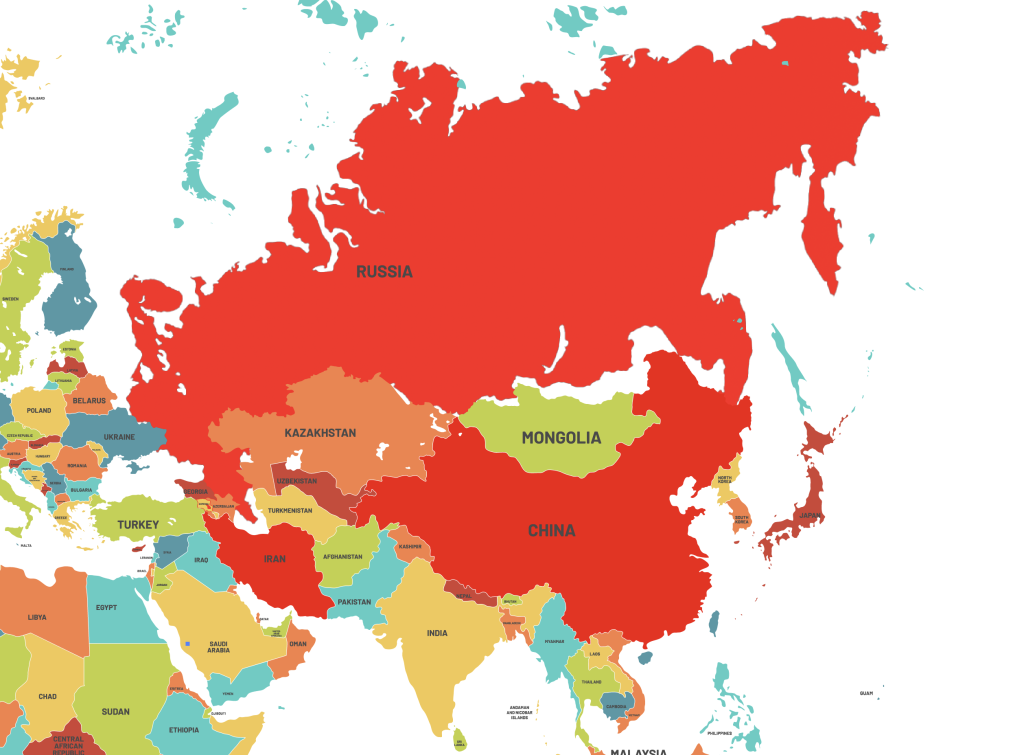
The increasing number of cooperation summits between Russia, China and Iran are taking place against the context of a decisive moment in global politics. Russia’s military build-up near the Ukraine border continues unabated, creating the fear of an imminent attack. Efforts are being made to revive the Iran nuclear deal, where Tehran is being offered relief from sanctions in return for halting uranium enrichment. Meanwhile, China and the US are at loggerheads over any number of issues, including the trade war launched by former President Trump, the battle for tech supremacy, and, most recently, over human rights concerns which resulted in Washington’s diplomatic boycott of the Beijing Winter Olympics.
The hard-line approach of the US towards every other rising power is not only paving way for further resistance even from mid-tier states like Iran, but also is pushing along a changing world order. In 2015, Professor and author John Mearsheimer had warned against unnecessary US provocation of Russia, arguing that it risked pushing the latter into China’s arms at a time when the US clearly needed Russia to contain Iran. It is important to understand why the US neglected the possibility of a China-Iran-Russia triad formation against its Western alliance.
China-Iran-Russia Naval exercises
The beginning of 2022 saw a joint naval exercise in the Gulf of Oman by China, Iran and Russia, following the first one conducted in 2019. According to Beijing, the aim of the three day exercise was to demonstrate the capability of the three nations to “jointly safeguard maritime security” and promote regional peace and stability. Chahbahar Port on the Gulf holds strategic and economic significance for China along with security concerns. Iranian officials stated that the purpose of the drill was to ensure “maritime security and create a maritime community with a common future” in an effort to “jointly support world peace.”
The statements on cooperation and world peace are ironic, given that increased cooperation amongst the three states comes at a time when all three are engaged in conflict with the US. It seems viable to show military muscle, especially on part of Iran so as to proclaim the support of great powers like China and Russia. For Russia, it seems wise to expand its sphere of influence in the Middle East, to be used as leverage when needed during the ongoing crisis over Ukraine.
China-Russia bilateral ties
Last year’s virtual summit between the Chinese and Russian leadership was the 37th meeting since relations revived in 2013. Their growing bilateral ties have been termed as alarming for US hegemony. The comprehensive strategic partnership focuses on several areas of cooperation, including pandemic response and energy cooperation, specifically in the domains of nuclear and renewable energy. More pertinent is their mutual divergence on the model of democracy championed by the West.
President Xi attended the 2014, Russian Sochi winter Olympics, being the first ever Chinese head of the state to attend an international sports event outside China. This year in the Beijing Winter Olympics, President Putin was the first among many foreign leaders to confirm his presence at the opening ceremony. Before the opening ceremony, a significant joint statement was released following the pre event Xi-Putin summit. Both sides understood the need of the hour and the necessity to reaffirm their support on each other’s foreign policy stances. Russian reaffirmation for the Chinese narrative on Taiwan and China’s reciprocal yet careful support on the Russian-Ukraine crisis posed a clear picture of strategic partnership between the two great powers. China stated that Russia’s concerns in Europe over Ukraine should be “taken seriously” by the United States. Russia and China also expressed concern over the “Cold war era” approach of the West. At the same time, on NATO expansion in Europe, the Chinese Foreign Minister stated, “Regional security cannot be guaranteed by strengthening or even expanding military blocs.”
Putin has termed the strategic significance of this foreign policy coordination between the two states as “coinciding approaches to solving global and regional issues.” By showing a united front on issues of security, cooperation and governance, the two great powers are looking eye to eye across the table with the US and its allies.
China-Iran strategic partnership
Adding to this bilateral reunion among Russia and China is a third partner, Iran, making it a perfect triad camp against the US. With the official launch of the 25-year cooperation deal at the beginning of this year China deepened its role further in the Middle East and Iran branched out to gain strong support against US sanctions. The deal came at a time when Iran’s economy is suffering under US sanctions amidst the pandemic. Under the threat of further sanctions and with ongoing denial of access to Western markets, Iran kept turning to China. The Strategic Cooperation Deal, worth nearly $400 billion, aims to enhance cooperation between China and Iran in the economic and strategic spheres; it entails several infrastructure projects, including airports, high-speed railways and subways.
According to a report by China’s Ministry of Foreign Affairs report (2021), “No matter how the world situation changes, China’s willingness to develop China-Iran relations will not change.” China reassured further that “China has opposed and will always oppose unreasonable unilateral sanctions imposed on Iran by the outside world. Any unilateral sanctions violate international law. In particular, sanctions based on lies and false information is a provocation to human conscience, loss of morality, and unpopularity.”
Regarding the Joint Comprehensive Plan of Action (JCPOA), China has ignored US sanctions on Iran. In a recent statement in response to the US Secretary of State’s repeated warnings to save the deal, China replied: “The US unilaterally withdrew from the JCPOA on the Iranian nuclear issue and created the current difficult situation. It should bear the main responsibility and correct its mistakes as soon as possible.”
Moreover, Iran’s support to China in the latter’s soft power projection campaign through the winter Olympics and its attendance of the opening ceremony when the US and the majority of the US allies are boycotting the event, shows courage and reliance on the “looking East” policy, now more than ever.
China-Iran-Russia Triad in the making:
In addition to the bilateral meetings of Russia and Iran vis-a-vis China, both states met in January this year to formulate a “framework” for an agreement governing economic and military cooperation. The Russia-Iran relations also find a common animosity towards the NATO expansion, laying down stronger grounds for Russian and Chinese sphere of influence in the Middle East and vice-versa in terms of Iran’s “look East” policy.
All this seems to make a compelling case for a triad in the making as a result of the continuous hostility by the United States towards China, Russia and Iran, a forceful attempt to subjugate states to deteriorating American supremacy in world politics. It also leaves the US with limited options to pursue, given the sanctions that have already been imposed.
Steve Tsang, a London based analyst, has said that the Chinese leadership is not only incredibly confident in their astute strategy but also is not worried about the American response. America must now create fresh options if it is to come out on top in this geopolitical competition and prevent other powers from joining the China camp.
![]()





Be the first to comment